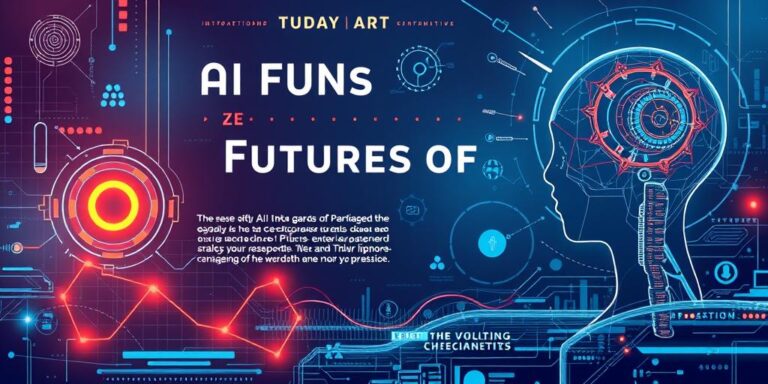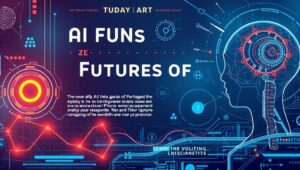The Future of AI: Predictions for the Next Decade (Post-2025)
Artificial intelligence (AI) is rapidly evolving, and its trajectory over the next decade promises to be transformative. This article will explore key predictions for the future of AI, focusing on the advancements and challenges expected beyond 2025. We’ll delve into technological breakthroughs, ethical considerations, and societal impacts, providing a comprehensive overview of what to expect in this dynamic field.
1. Enhanced Natural Language Processing (NLP)
NLP will continue to improve, enabling more seamless and context-aware interactions between humans and machines. Expect to see AI-powered virtual assistants that truly understand and anticipate user needs, leading to more efficient communication and problem-solving.
- Advancements: Improved sentiment analysis, multilingual support, and contextual understanding.
- Impact: Better customer service, more accurate translations, and personalized content creation.
2. Rise of Edge AI
Edge AI, which processes data locally on devices rather than in the cloud, will become more prevalent. This shift will enhance privacy, reduce latency, and enable AI applications in remote or resource-constrained environments.
- Advancements: Development of specialized AI chips and algorithms optimized for edge devices.
- Impact: Real-time data processing for autonomous vehicles, smart homes, and industrial IoT.
3. AI in Healthcare Revolution
AI will play an increasingly critical role in healthcare, from diagnostics and treatment planning to drug discovery and personalized medicine. Expect AI-driven tools to improve patient outcomes and streamline healthcare operations.
- Advancements: AI-powered diagnostic tools, robotic surgery, and predictive analytics for disease outbreaks.
- Impact: Earlier and more accurate diagnoses, personalized treatment plans, and reduced healthcare costs.
4. Autonomous Systems and Robotics
Autonomous systems, including robots and drones, will become more sophisticated and integrated into various industries. These systems will perform tasks ranging from logistics and manufacturing to surveillance and exploration.
- Advancements: Enhanced sensor technology, improved navigation algorithms, and better human-robot collaboration.
- Impact: Increased efficiency in logistics, automation of manufacturing processes, and enhanced safety in hazardous environments.
5. Ethical AI and Governance
As AI becomes more pervasive, ethical considerations and governance frameworks will become increasingly important. Ensuring fairness, transparency, and accountability in AI systems will be crucial to building trust and preventing misuse.
- Advancements: Development of AI ethics guidelines, regulatory frameworks, and tools for detecting bias in AI models.
- Impact: More equitable and trustworthy AI systems, reduced risk of unintended consequences, and greater public acceptance of AI technologies.
6. AI-Driven Cybersecurity
AI will be used to enhance cybersecurity defenses, detecting and responding to threats more quickly and effectively. AI-powered security systems will adapt to evolving threats and provide proactive protection against cyberattacks.
- Advancements: AI-based threat detection, automated incident response, and predictive security analytics.
- Impact: Reduced risk of data breaches, improved network security, and faster response times to cyber threats.
7. Quantum AI
The intersection of quantum computing and AI, known as Quantum AI, holds the potential to solve complex problems beyond the reach of classical computers. While still in its early stages, Quantum AI could revolutionize fields such as drug discovery, materials science, and financial modeling.
- Advancements: Development of quantum algorithms for AI, quantum machine learning models, and quantum-enhanced optimization techniques.
- Impact: Breakthroughs in drug discovery, more efficient materials design, and improved financial forecasting.
8. AI in Education
AI will transform education by providing personalized learning experiences, automating administrative tasks, and offering intelligent tutoring systems. AI-driven tools will adapt to individual student needs, providing customized support and feedback.
- Advancements: AI-powered personalized learning platforms, automated grading systems, and virtual tutors.
- Impact: Improved student outcomes, more efficient teaching methods, and greater access to education.
9. AI and the Future of Work
AI will continue to reshape the job market, automating some tasks while creating new opportunities. Preparing the workforce for this transition will require investments in education and training programs focused on AI-related skills.
- Advancements: AI-driven automation of routine tasks, development of new AI-related job roles, and upskilling initiatives.
- Impact: Increased productivity, new job opportunities in AI-related fields, and a shift towards more creative and strategic work.
10. AI and Climate Change
AI will play a crucial role in addressing climate change, from optimizing energy consumption to developing sustainable solutions. AI-powered tools will help monitor environmental conditions, predict climate patterns, and accelerate the transition to a low-carbon economy.
- Advancements: AI-driven energy management systems, climate modeling, and sustainable agriculture practices.
- Impact: Reduced greenhouse gas emissions, improved energy efficiency, and more sustainable resource management.
Conclusion
The future of AI is filled with both promise and challenges. As AI technology continues to advance, it is essential to address ethical considerations, promote responsible development, and prepare for the societal impacts. By embracing AI’s potential while mitigating its risks, we can harness its power to create a better future for all.




